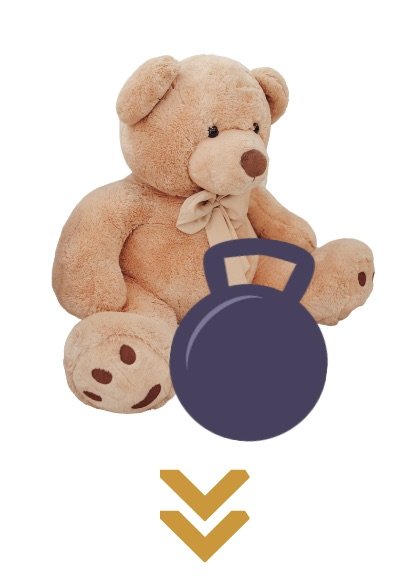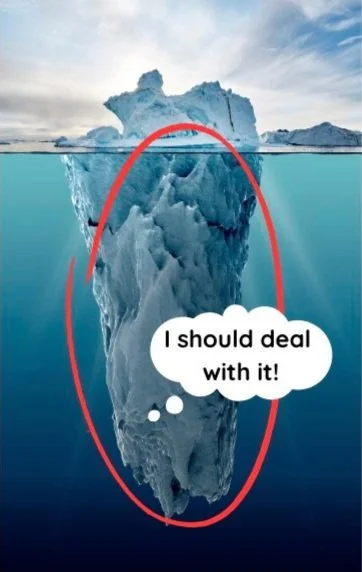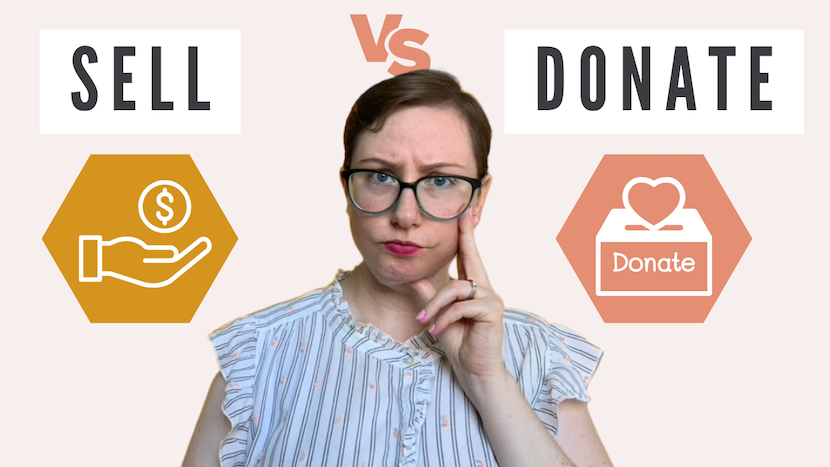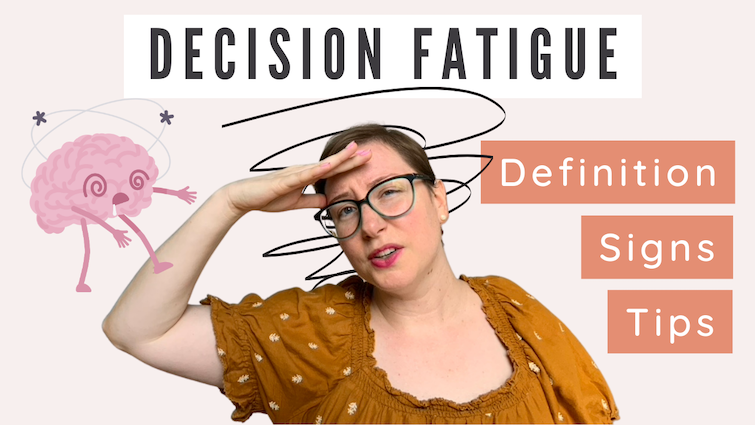The 4 types of clutter: Which effects do they have on you? What to do about it?
What is the clutter in your life, and which effects does it have on you? There might be more ways than you think what clutter is, and if you're curious, then keep on reading or watch the video. 🎥
What comes to your mind when you hear the word clutter?
The first image that comes to my mind is a very cluttered living room. For example, I see magazines and paper piles on all the different surfaces. I might see different toys or random electronics piled on the floor. For me, clutter means piles, full closets, drawers, and too much of everything.
1. Material Clutter
What I described above is actually only the material clutter. Depending on how much it is, some people might call it 'creative chaos.' They feel inspired when they see all their things outside and get good ideas. And for others, it's just too much visual stimulation, and they feel burdened and actually stressed by it.
But there are more forms of clutter!
2. Digital Clutter
These are all the things that you have on your computer, all the files, photos, movies, videos, and music. Also, what's on your smartphone, and your tablet. The list goes on with your hard drives, USB sticks, and what's in the Cloud. And if we think more about it, it's also social media. So all the apps that you have on your computer and mobile devices and everything that happens there - the conversations, photos, videos, etc.
And again, it does not have to be problematic. Let's think about your laptop. Maybe when you open it, you have a few things on your desktop. It's a little bit cluttered, but not too bad. However, if the entire computer desktop is filled with documents and you cannot even see the background picture, then feelings of stress are a logical consequence.
Another big stress trigger is an overflowing email inbox. When you open your inbox, and there's a red bubble saying "You have 1000 emails that you still have to read and answer." That can create a significant amount of pressure.
Mental Clutter (Mental Load)
Next, there is mental clutter, and another name for that would be mental load. You know, when you have so much going on in your head, that you feel your head might burst?
Mental load also means finding solutions in your head, and this type of clutter will not stay in your head. Usually, it goes into phone notes where you type all your to-do lists, or it goes into post-it notes.
Emotional Clutter
And the last form of clutter I want to mention today is emotional clutter. And in my opinion, emotional clutter is the biggest clutter of them all. Even if you don't see it, even if it's unconsciously underneath the surface, it's all there!
Some emotions might pop up once in a while. Maybe you hear somebody talking and you feel triggered by what they're saying. Or you might watch a movie and from one moment to the next you feel very upset and start crying, and you don't really know why you started even crying.
All of the emotions, all of the experiences, all of your thoughts, all of your belongings, material ones and digital ones, that's all you. And surprise, surprise, everything is interconnected.
Example of positive emotional clutter
Imagine years and years ago, you went to a Beyoncé concert, and at that concert, you bought a T-shirt. It's an amazing t-shirt. It has seen better times, and has a lot of holes, but you love this T-shirt.
Marie Kondo would say this T-shirt sparks joy. And the memories and the feelings that you connect with it are sparking so much joy and excitement, and you love it. And this is super positive. This T-shirt is like a balloon that pulls you up in the air and makes you lighter and happier.
Example of negative emotional clutter
Let's now imagine you have a huge teddy bear that you got from an ex-partner. And it's actually a cute teddy bear. It's not too bad, but it's a huge thing, and it's in the corner of your closet, and you actually don't even want to see it because when you see it, you remember all the negative things that happened in that relationship, why you split up, what happened there, and you feel ambivalent.
Shall I keep it? Shall I let it go? What do I even want to do? I don't want to deal with it now. That's why I push it in the corner of my closet. These emotions are like a heavyweight, pulling you downwards and making it heavy.
And I just described two items, the Beyoncé T-shirt and the huge teddy bear. But you own tens of thousands of items in digital files and emotions and thoughts, and all of this is there. And there are all of the balloons, but also all the heavyweights, and it's all present.
Ways to dealing with your clutter
Many people don't even think about it. They live their life on autopilot. Others are aware that there are things under the surface, and they know I should deal with them. And then others are actually doing exactly that.
There are different ways to do that. For example, for the emotional clutter, you can go to therapy, and you work through all the hurts, all the pain. You try to understand what happened back then and how to navigate your life now.
If you have a very big mental load, you might get a coach who helps you with productivity by prioritizing what has to come first and what can fall over.
And then, of course, you can also tackle your material and digital belongings and declutter and organize them.
And if you cannot do it by yourself, you might hire somebody like me, a Professional Organizer and KonMari® Consultant. Somebody who goes bit by bit through each layer of all of the clutter. And the good news is it doesn't matter where you start; you just have to start somewhere.
What are the negative effects of clutter?
Clutter can become an emotional and psychological burden, and it can create feelings of overwhelm, anxiety, stress, and even shame.
Too much clutter can also hinder our productivity and focus. Imagine you have a lot of clutter in your home, all the material things, plus a ton of digital clutter, and then what's going on in your heart and mind. How will you focus on what is the most important thing? You might not even know because you're focusing on one thing, then another thing pops up, and you hop from one thing to the next.
How will you be able to focus and not feel distracted? How will you reach your dreams? Because it's tough when clutter confuses and distracts us.
How does decluttering help?
Decluttering can be a therapeutic process, and it helps you to see what attachment you have to each one of your belongings. Through this process, you'll discover what's essential in your life and what's not.
Decluttering is a chance to let go of the past, to actually work through the past, and to focus on your present and future. And decluttering is just pure math. If you own less, if you let things go, you will have more space, and you will have more space in your outer life, inner life, heart, and mind.
And then comes the question...
What do you do with that new space?
Are you going to work on yourself? Will you have the time and the capacity to go to therapy or to improve your relationships? Or to fulfill that dream you've wanted to do?
It's not about letting everything go or letting everything stay. It's about looking at each thing and making informed decisions with your ideal lifestyle vision in mind. What is where you want to go, and does this thing, this thought, this emotion, this friendship support you to get where you want to go?
If you would like to simplify your life to let go of the things that don't serve you anymore, to start decluttering your home and your life, here is how you can work with me.







